
DB U.S. Food_watermark
.pdf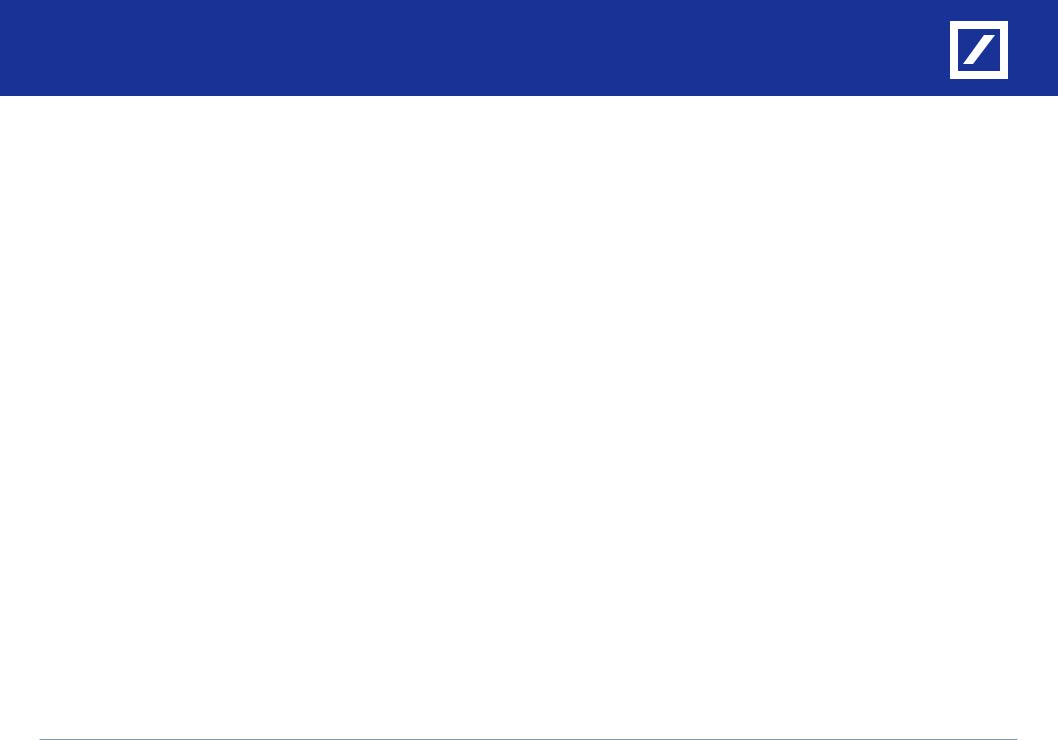
vk.com/id446425943
Valuation & Risks
U.S. Food Sector: For U.S. food companies, we derive our price targets using multiples relative to our current sector P/E multiple of 17x. Upside risks: better top-line growth, cost savings, M&A, U.S. corporate tax reform. Downside risks: material changes in macroeconomic trends, an increase in interest rates, heightened competitive and promotional activity, and commodity inflation.
Campbell Soup (HOLD, PT $35): We apply a 20% discount to the current group multiple against our EPS estimate 24-month forward. We justify the discounted relative multiple given weak base business top-line performance, near-term volume pressures, higher reinvestment needs, near-term disruption related to the acquisition integration, and management change related uncertainty. Upside risks include the outright sale of the company at a higher-than-expected offer price, lower input costs, market share stabilization, and cost savings ahead of forecasts. Downside risks include heightened competition, category deceleration, cost inflation, costsavings potential complications, and currency effects.
Conagra Brands (BUY, PT $42): To derive our price target, we apply a slight discount to the sector P/E multiple against our 24-month forward EPS estimate, which we believe is justified given up-front uncertainty regarding pro forma guidance. Downside risks include potential increased competition, continued or incremental input cost inflation, general Pinnacle Foods integration/execution-related risk, and the potential for currently positive consumer perception surrounding the frozen category to erode over the long term.
Dean Foods (HOLD, PT $5): Our price target is derived by applying a 30% discount on the sector multiple to our 24-month forward EPS estimate, which we believe is justified by the recent acceleration in volume losses and plant deleverage. Downside risks to our Hold rating include continued news reports related to contracts lost by Dean Foods at key retailers, announcements of plans to build additional milk processing capacity in-house by retailers, continued deterioration of free cash flow, and continued cost inflation. Upside risks to our Hold rating include incremental cost structure enhancement measures, involved activist increasing stake in company and/or obtaining board seats, and an outright sale of the company.
Deutsche Bank |
Rob Dickerson, (+1) 212-250-2160, rob.dickerson@db.com |
31 |
|
|
Source: Deutsche Bank |
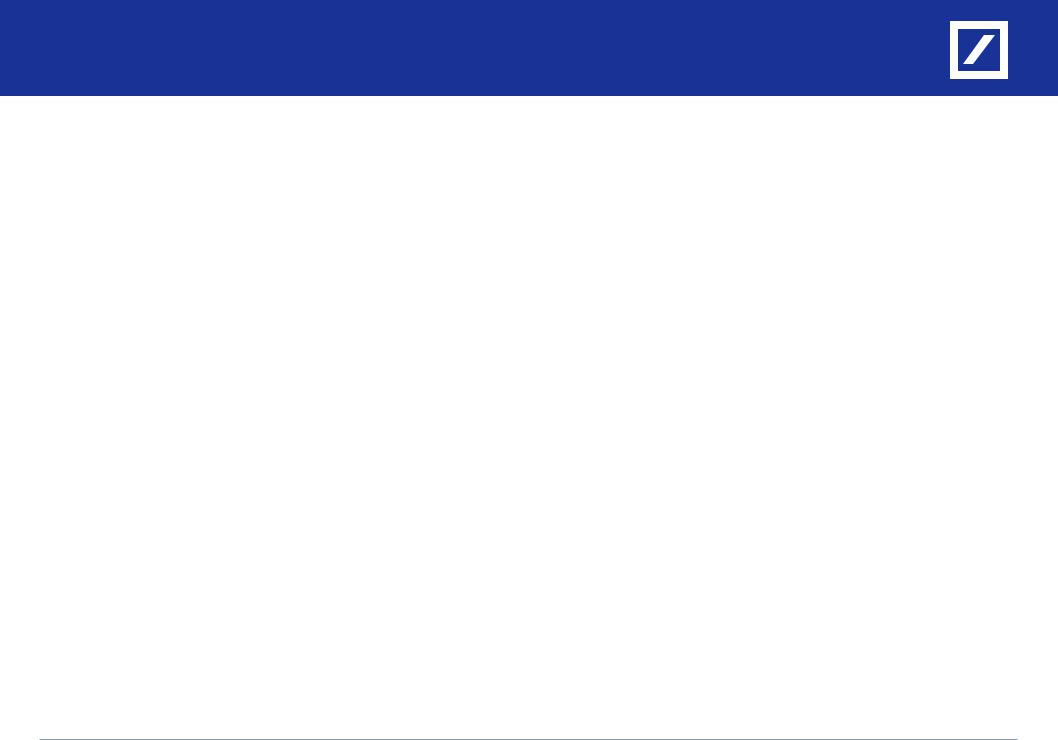
vk.com/id446425943
Valuation & Risks
Flowers Foods (HOLD, PT $18): We apply the current sector multiple against our 24-month forward EPS estimate to arrive at our price target, justified by the company's advantaged top-line growth profile and strong balance sheet relative to peers being offset by cost inflation headwinds and an expected increase in competitive pressure. Upside risks include: the announcement and execution of cost-reduction measures that are more aggressive than expected, and the announcement of accretive acquisitions. Downside risks include: execution on cost-savings initiatives and margin targets taking longer than expected, cost inflation headwinds worsening, and increased competition (i.e., new entrants into organic bread, pricing risk in conventional fresh bread, continued shares losses in baked snacks).
General Mills (HOLD, PT $46): We apply a 20% relative discount to the current group multiple against our 24month forward EPS estimates. General Mills has historically traded at a 5% P/E discount to peers, but we feel the company should trade at a greater discount to peers due to uncertainty around further investment needs and longer-term margin expansion potential. Upside risks include lower-than-expected input costs, better-than- expected ROI on brand investments in key categories, and a higher level of synergy capture from the BUFF acquisition. Downside risks include volume deleverage, increased competition in the company's growth platform categories, foreign exchange headwinds, and higher-for-longer cost inflation.
Hain Celestial (BUY, PT $27): We apply a 15% premium to the sector multiple on our 24-month forward EPS estimate and incorporate the implied equity value from our scenario analysis to derive our price target. Downside risks include: increased competition in any key category, top brand distribution losses, low ROI on brand-building investments, new CEO may materially change the company's direction and strategy.
Deutsche Bank |
Rob Dickerson, (+1) 212-250-2160, rob.dickerson@db.com |
32 |
|
|
Source: Deutsche Bank |
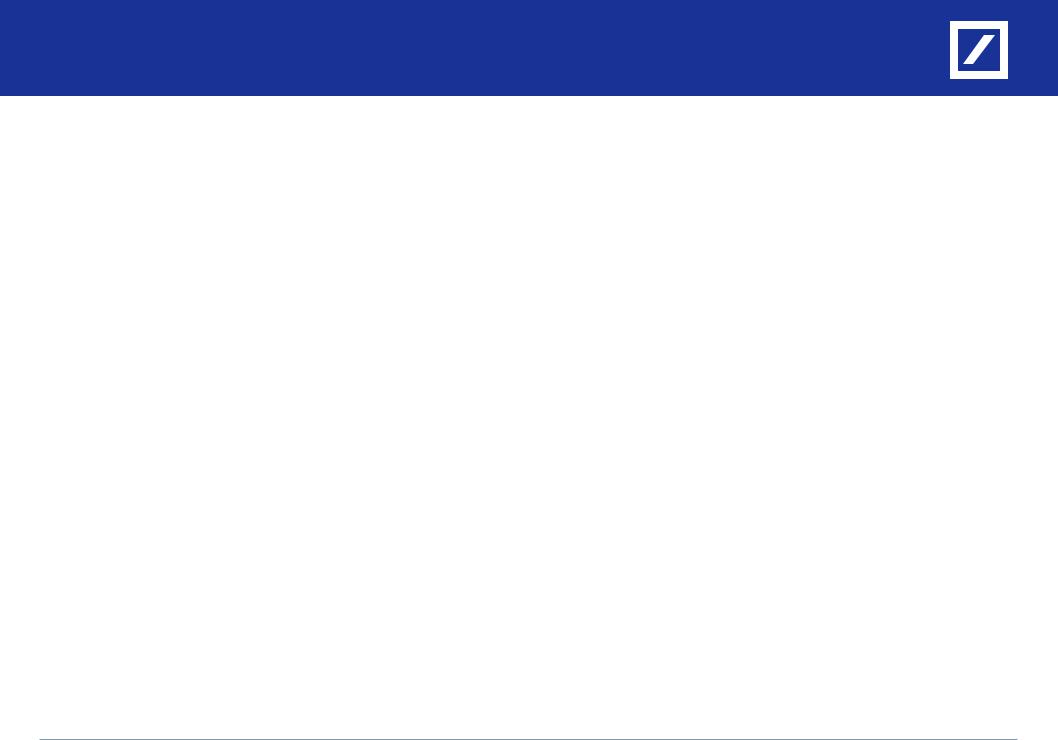
vk.com/id446425943
Valuation & Risks
Hershey (HOLD, PT $110): We value the shares by applying a ~7% premium to the U.S. food sector multiple on our 24-month forward EPS estimate, justified by Hershey being one of the least-levered companies in the space, acquiring more exposure to the faster-growing snacking category, selecting acquisition assets that can utilize the company's core competencies, and having margin improvement opportunity. Upside risks include faster-than- expected margin or pricing improvement; downside risks include increasingly competitive category dynamics, acquisition velocity growth sustainability risk, incremental brand investment potential given recent N.A. CMG revenue growth and share trends, and retailer-driven profitability and optimization measures.
Hostess Brands (HOLD, PT $11): We apply a 10% discount the sector P/E multiple against our 24-months forward EPS estimate, justified by our base business profitability and growth outlook. Upside risks: top-line growth, share gains, profitability growth, and M&A activity. Downside risks: increased category competition, reinvestment needs, category deceleration, and input cost volatility. Upside risks: top-line growth, share gains, profitability growth, and M&A activity. Downside risks: increased category competition, reinvestment needs, category deceleration, and input cost volatility.
Kellogg (HOLD, PT $66): We value the shares at a 10% discount to the current group multiple against our EPS estimate 24 months forward, justified by the company's near-term outlook as it continues to make investments to fuel future growth. Upside risks include improving category consumption rates and sooner-than-expected margin/mix improvements. Downside risks include higher-than-expected brand investment needs and continued cost inflation headwinds.
Kraft Heinz (BUY, PT $63): To derive our price target, we apply a 10% discount to the food sector P/E multiple against our 24-month forward EPS estimate given fundamental near-term top-line and profitability risk. Risks include further developed and emerging market category competition, category deceleration, margin deleverage off volume weakness, increased brand investment needs, input cost volatility, and valuation multiples vis-à-vis the company's acquisition strategy.
Deutsche Bank |
Rob Dickerson, (+1) 212-250-2160, rob.dickerson@db.com |
33 |
|
|
Source: Deutsche Bank |
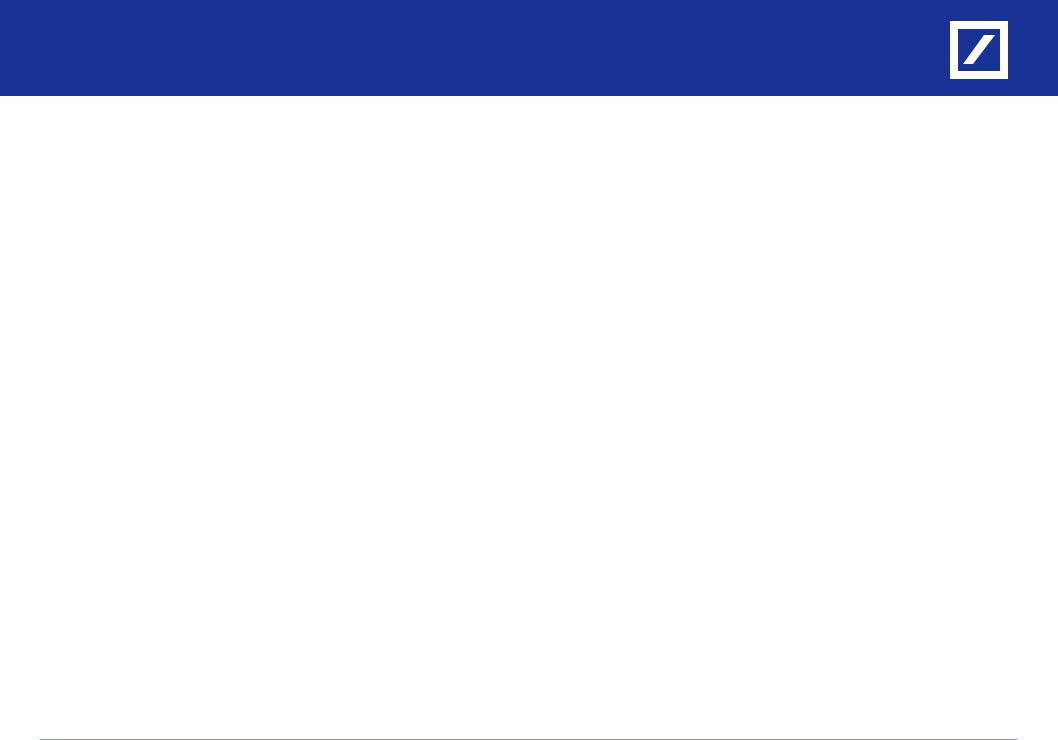
vk.com/id446425943
Valuation & Risks
McCormick (SELL, PT $117): We place a premium of 25% on the relative P/E food sector multiple against our two-year forward EPS forecast, justified by superior organic sales growth relative to its large-cap U.S.-based food peers, combined with deal-driven margin expansion opportunity. Upside risks: outperformance of U.S. base business and RB Foods brands, higher-than-anticipated revenue synergies, and higher cost savings driving operating profit growth.
Mondelez (BUY, PT $48): Our price target is derived by applying a 5% premium to the current group multiple against our 24-months forward EPS estimate. Mondelez has historically traded in line with peers, but we feel the company deserves to trade at a modest premium to its U.S. food peers vs. historical levels and at less of a discount currently to larger CPG multinationals, given beneficial end-market positioning, strategic optionality, longterm cost savings, and margin expansion potential. Downside risks include emerging market growth deceleration, increased competition in key categories, a stronger USD, margin deleverage off volume weakness, and input cost volatility.
Nomad Foods (BUY, PT $23): Our price target is based on our 24-month forward EPS forecast and a 15% relative P/E valuation discount to its U.S.-based peers, owing to the company’s being fully exposed to Europe and listed in the U.S. We have factored in slight multiple expansion from current valuation, justified by the company’s better-than-peer top-line results, double-digit EPS growth potential, stepped-up FCF in 2018, and strengthening capital structure. Downside risks include volume pressure given weight-out pricing strategy, higher-than-expected brand investment needs, further private label share gains, macro and currency headwinds, and FCF compression.
Simply Good Foods (BUY, PT $21): We apply a 75% premium to the current sector P/E multiple against our 24months forward EPS. We believe this premium is justified by the company's best-in-class LT growth and return profiles, as well as its strong cash flow generation and utilization optionality. Downside risk factors include category deceleration, increased competition, retailer pricing pushback and shelf space constraints, input cost inflation, and lower-than-expected new buyer gains off of the company’s self-directed consumer strategy.
Deutsche Bank |
Rob Dickerson, (+1) 212-250-2160, rob.dickerson@db.com |
34 |
|
|
Source: Deutsche Bank |
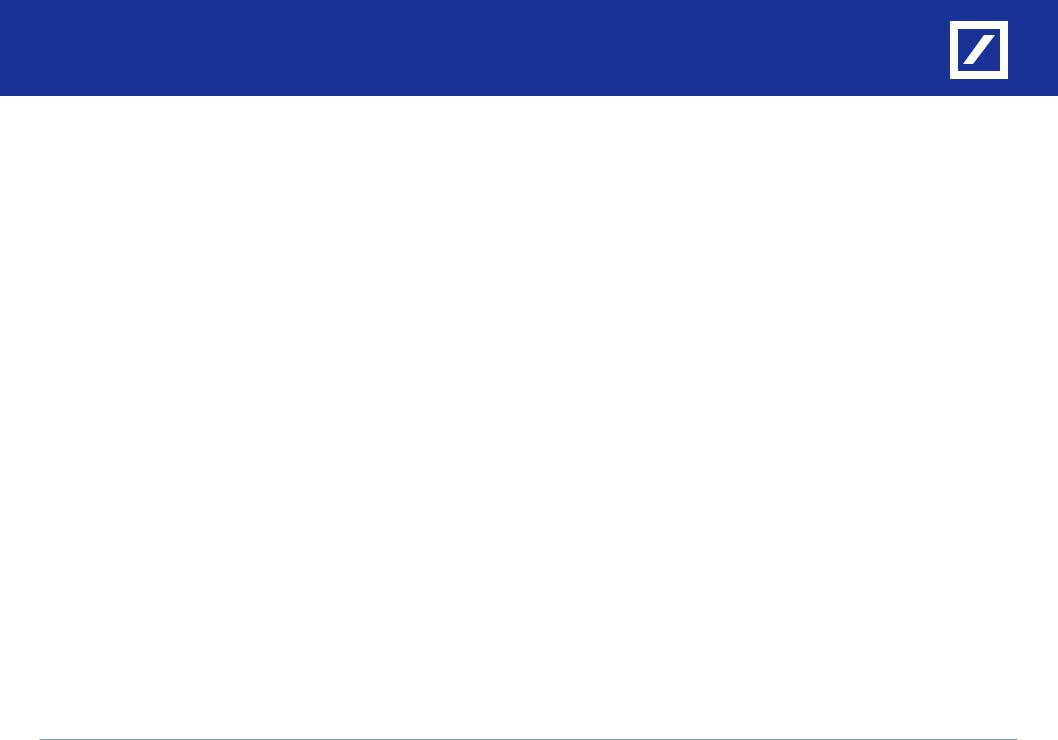
vk.com/id446425943
Valuation & Risks
J.M. Smucker (HOLD, PT $107): We apply a ~30% discount to the current group multiple, in line with market valuation, against our 24-month forward EPS estimate (including amortization). Given near-term risks to the top line and overall brand investment needs, we find it fair to apply a larger discount than the stock's historical ~10% discount to peers. Upside risks include higher-than-expected cost savings from current initiatives, category share gains from brand support or innovation, lower-than-expected input costs and accretive M&A. Downside risks include increased category competition, reinvestment needs, input cost volatility, and M&A integration.
Deutsche Bank |
Rob Dickerson, (+1) 212-250-2160, rob.dickerson@db.com |
35 |
|
|
Source: Deutsche Bank |
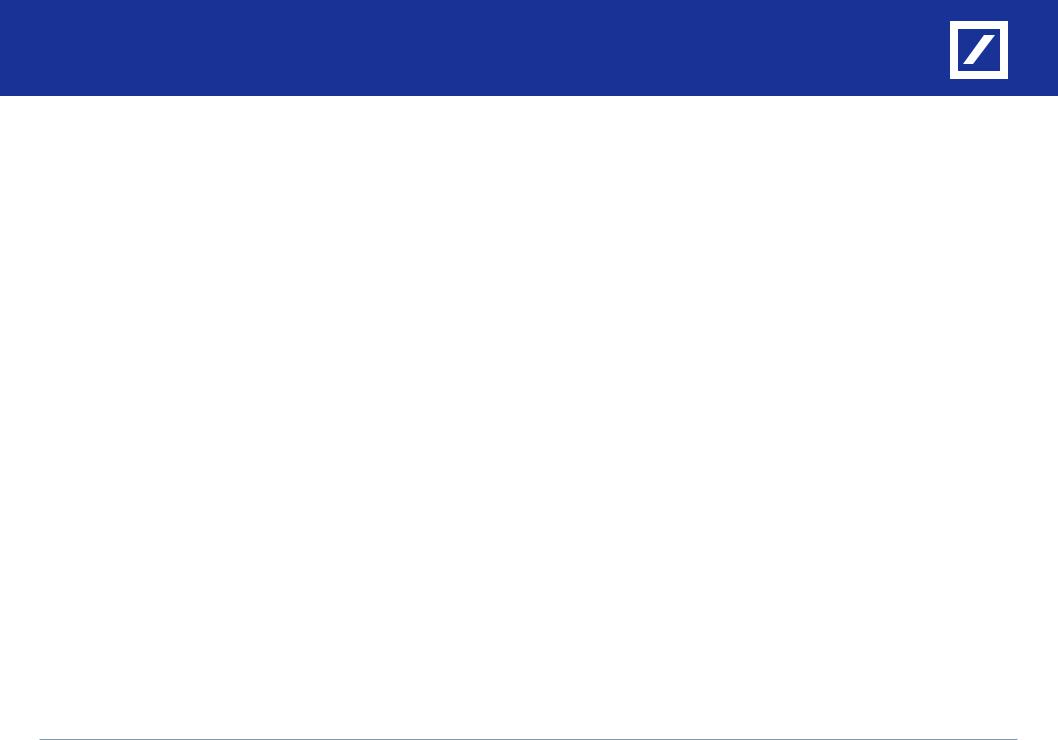
vk.com/id446425943
U.S. Consumer Products & Food Related Coverage List
FOOD |
|
HPC, BEVERAGES & TOBACCO |
||
Rob Dickerson |
|
Steve Powers |
|
Faiza Alwy |
|
|
|||
1-212-250-2160 |
|
1-212-250-5480 |
|
1-212-250-7611 |
rob.dickerson@db.com |
|
stephen.powers@db.com |
|
faiza.alwy@db.com |
Coverage List |
|
Coverage List |
|
Coverage List |
Campbell Soup |
|
Altria |
|
Avon |
Conagra Brands |
|
Brown-Forman |
|
Cott Corporation |
Dean Foods |
|
Church & Dwight |
|
Coty, Inc. |
Flowers Foods |
|
Clorox |
|
Edgewell Personal Care |
General Mills |
|
Coca-Cola |
|
Energizer |
Hain Celestial |
|
Coca-Cola European Partners |
|
International Flavors & Fragrances |
Hershey |
|
Colgate-Palmolive |
|
Nu Skin Enterprises |
Hostess Brands |
|
Constellation Brands |
|
Spectrum Brands |
J.M. Smucker |
|
Dr Pepper Snapple Group |
|
Valvoline |
Kellogg |
|
Estee Lauder |
|
|
Kraft Heinz |
|
Kimberly-Clark |
|
|
McCormick |
|
Molson Coors Brewing |
|
|
Mondelez International |
|
Monster Beverage Corp. |
|
|
Nomad Foods |
|
Newell Brands |
|
|
Simply Good Foods |
|
PepsiCo |
|
|
|
|
Procter & Gamble |
|
|
Matt Fishbein |
|
|
|
|
1-212-250-3551 |
|
|
|
|
matt.fishbein@db.com |
|
|
|
|
Deutsche Bank |
Rob Dickerson, (+1) 212-250-2160, rob.dickerson@db.com |
36 |

vk.com/id446425943
15 November 2018 Food
U.S. Food
Appendix 1
Important Disclosures
*Other information available upon request
*Prices are current as of the end of the previous trading session unless otherwise indicated and are sourced from local exchanges via Reuters, Bloomberg and other vendors . Other information is sourced from Deutsche Bank, subject companies, and other sources. For disclosures pertaining to recommendations or estimates made on securities other than the primary subject of this research, please see the most recently published company report or visit our global disclosure look-up page on our website at https://research.db.com/Research/Disclosures/CompanySearch. Aside from within this report, important risk and conflict disclosures can also be found at https://research.db.com/Research/Topics/Equities? topicId=RB0002. Investors are strongly encouraged to review this information before investing.
Analyst Certification
The views expressed in this report accurately reflect the personal views of the undersigned lead analyst about the subject issuers and the securities of those issuers. In addition, the undersigned lead analyst has not and will not receive any compensation for providing a specific recommendation or view in this report. Rob Dickerson
Equity Rating Key |
Equity rating dispersion and banking relationships |
Buy: Based on a current 12month view of total share-holder |
|
return (TSR = percentage change in share price from current |
|
price to projected target price plus pro-jected dividend yield ) , |
|
we recommend that investors buy the stock. |
|
Sell: Based on a current 12-month view of total share-holder |
|
return, we recommend that investors sell the stock. |
|
Hold: We take a neutral view on the stock 12-months out and, |
|
based on this time horizon, do not recommend either a Buy |
|
or Sell. |
|
Newly issued research recommendations and target prices |
|
supersede previously published research. |
|
|
|
Page 4 |
Deutsche Bank Securities Inc. |

vk.com/id44642594315 November 2018
Food U.S. Food
Additional Information
The information and opinions in this report were prepared by Deutsche Bank AG or one of its a liates (collectively "Deutsche Bank"). Though the information herein is believed to be reliable and has been obtained from public sources believed to be reliable, Deutsche Bank makes no representation as to its accuracy or completeness. Hyperlinks to thirdparty websites in this report are provided for reader convenience only. Deutsche Bank neither endorses the content nor is responsible for the accuracy or security controls of those websites.
If you use the services of Deutsche Bank in connection with a purchase or sale of a security that is discussed in this report, or is included or discussed in another communication (oral or written) from a Deutsche Bank analyst, Deutsche Bank may act as principal for its own account or as agent for another person.
Deutsche Bank may consider this report in deciding to trade as principal. It may also engage in transactions, for its own account or with customers, in a manner inconsistent with the views taken in this research report. Others within Deutsche Bank, including strategists, sales sta and other analysts, may take views that are inconsistent with those taken in this research report. Deutsche Bank issues a variety of research products, including fundamental analysis, equity-linked analysis, quantitative analysis and trade ideas. Recommendations contained in one type of communication may di er from recommendations contained in others, whether as a result of di ering time horizons, methodologies, perspectives or otherwise. Deutsche Bank and/or its a liates may also be holding debt or equity securities of the issuers it writes on. Analysts are paid in part based on the profitability of Deutsche Bank AG and its a liates, which includes investment banking, trading and principal trading revenues.
Opinions, estimates and projections constitute the current judgment of the author as of the date of this report. They do not necessarily reflect the opinions of Deutsche Bank and are subject to change without notice. Deutsche Bank provides liquidity for buyers and sellers of securities issued by the companies it covers. Deutsche Bank research analysts sometimes have shorter-term trade ideas that may be inconsistent with Deutsche Bank's existing longer-term ratings. Some trade ideas for equities are listed as Catalyst Calls on the Research Website ( https://research.db.com/Research/ ) , and can be found on the general coverage list and also on the covered company ’ s page. A Catalyst Call represents a high-conviction belief by an analyst that a stock will outperform or underperform the market and/or a specified sector over a time frame of no less than two weeks and no more than three months. In addition to Catalyst Calls, analysts may occasionally discuss with our clients, and with Deutsche Bank salespersons and traders, trading strategies or ideas that reference catalysts or events that may have a near-term or medium-term impact on the market price of the securities discussed in this report, which impact may be directionally counter to the analysts' current 12-month view of total return or investment return as described herein. Deutsche Bank has no obligation to update, modify or amend this report or to otherwise notify a recipient thereof if an opinion, forecast or estimate changes or becomes inaccurate. Coverage and the frequency of changes in market conditions and in both general and company-specific economic prospects make it di cult to update research at defined intervals. Updates are at the sole discretion of the coverage analyst or of the Research Department Management, and the majority of reports are published at irregular intervals. This report is provided for informational purposes only and does not take into account the particular investment objectives, financial situations, or needs of individual clients. It is not an o er or a solicitation of an o er to buy or sell any financial instruments or to participate in any particular trading strategy. Target prices are inherently imprecise and a product of the analyst ’ s judgment. The financial instruments discussed in this report may not be suitable for all investors, and investors must make their own informed investment decisions. Prices and availability of financial instruments are subject to change without notice, and investment transactions can lead to losses as a result of price fluctuations and other factors. If a financial instrument is denominated in a currency other than an investor's currency, a change in exchange rates may adversely a ect the investment. Past performance is not necessarily indicative of future results. Performance calculations exclude transaction costs, unless otherwise indicated. Unless otherwise indicated, prices are current as of the end of the previous trading session and are sourced from local exchanges via Reuters, Bloomberg and other vendors. Data is also sourced from Deutsche Bank, subject companies, and other parties.
The Deutsche Bank Research Department is independent of other business divisions of the Bank. Details regarding our organizational arrangements and information barriers we have to prevent and avoid conflicts of interest with respect to our research are available on our website ( https://research.db.com/Research/ ) under Disclaimer.
Deutsche Bank Securities Inc. |
Page 5 |

vk.com/id446425943
15 November 2018 Food
U.S. Food
Macroeconomic fluctuations often account for most of the risks associated with exposures to instruments that promise to pay fixed or variable interest rates. For an investor who is long fixed-rate instruments (thus receiving these cash flows), increases in interest rates naturally lift the discount factors applied to the expected cash flows and thus cause a loss. The longer the maturity of a certain cash flow and the higher the move in the discount factor, the higher will be the loss. Upside surprises in inflation, fiscal funding needs, and FX depreciation rates are among the most common adverse macroeconomic shocks to receivers. But counterparty exposure, issuer creditworthiness, client segmentation, regulation (including changes in assets holding limits for di erent types of investors), changes in tax policies, currency convertibility (which may constrain currency conversion, repatriation of profits and/or liquidation of positions), and settlement issues related to local clearing houses are also important risk factors. The sensitivity of fixedincome instruments to macroeconomic shocks may be mitigated by indexing the contracted cash flows to inflation, to FX depreciation, or to specified interest rates – these are common in emerging markets. The index fixings may – by construction – lag or mis-measure the actual move in the underlying variables they are intended to track. The choice of the proper fixing (or metric) is particularly important in swaps markets, where floating coupon rates (i.e., coupons indexed to a typically short-dated interest rate reference index) are exchanged for fixed coupons. Funding in a currency that di ers from the currency in which coupons are denominated carries FX risk. Options on swaps (swaptions) the risks typical to options in addition to the risks related to rates movements.
Derivative transactions involve numerous risks including market, counterparty default and illiquidity risk. The appropriateness of these products for use by investors depends on the investors' own circumstances, including their tax position, their regulatory environment and the nature of their other assets and liabilities; as such, investors should take expert legal and financial advice before entering into any transaction similar to or inspired by the contents of this publication. The risk of loss in futures trading and options, foreign or domestic, can be substantial. As a result of the high degree of leverage obtainable in futures and options trading, losses may be incurred that are greater than the amount of funds initially deposited – up to theoretically unlimited losses. Trading in options involves risk and is not suitable for all investors. Prior to buying or selling an option, investors must review the "Characteristics and Risks of Standardized Options”, at http://www.optionsclearing.com/about/publications/character-risks.jsp . If you are unable to access the website, please contact your Deutsche Bank representative for a copy of this important document.
Participants in foreign exchange transactions may incur risks arising from several factors, including the following: (i) exchange rates can be volatile and are subject to large fluctuations; (ii) the value of currencies may be a ected by numerous market factors, including world and national economic, political and regulatory events, events in equity and debt markets and changes in interest rates; and (iii) currencies may be subject to devaluation or government-imposed exchange controls, which could a ect the value of the currency. Investors in securities such as ADRs, whose values are a ected by the currency of an underlying security, e ectively assume currency risk.
Unless governing law provides otherwise, all transactions should be executed through the Deutsche Bank entity in the investor's home jurisdiction. Aside from within this report, important conflict disclosures can also be found at https://research.db.com/Research/ on each company ’ s research page. Investors are strongly encouraged to review this information before investing.
Deutsche Bank (which includes Deutsche Bank AG, its branches and a liated companies) is not acting as a financial adviser, consultant or fiduciary to you or any of your agents (collectively, “You” or “Your”) with respect to any information provided in this report. Deutsche Bank does not provide investment, legal, tax or accounting advice, Deutsche Bank is not acting as your impartial adviser, and does not express any opinion or recommendation whatsoever as to any strategies, products or any other information presented in the materials. Information contained herein is being provided solely on the basis that the recipient will make an independent assessment of the merits of any investment decision, and it does not constitute a recommendation of, or express an opinion on, any product or service or any trading strategy.
The information presented is general in nature and is not directed to retirement accounts or any specific person or account type, and is therefore provided to You on the express basis that it is not advice, and You may not rely upon it in making Your decision. The information we provide is being directed only to persons we believe to be financially sophisticated, who are capable of evaluating investment risks independently, both in general and with regard to particular transactions and investment strategies, and who understand that Deutsche Bank has financial interests in the o ering of its products
Page 6 |
Deutsche Bank Securities Inc. |

vk.com/id44642594315 November 2018
Food U.S. Food
and services. If this is not the case, or if You are an IRA or other retail investor receiving this directly from us, we ask that you inform us immediately.
In July 2018, Deutsche Bank revised its rating system for short term ideas whereby the branding has been changed to Catalyst Calls (“CC”) from SOLAR ideas; the rating categories for Catalyst Calls originated in the Americas region have been made consistent with the categories used by Analysts globally; and the e ective time period for CCs has been reduced from a maximum of 180 days to 90 days.
United States: Approved and/or distributed by Deutsche Bank Securities Incorporated, a member of FINRA, NFA and SIPC. Analysts located outside of the United States are employed by non-US a liates that are not subject to FINRA regulations.
Germany: Approved and/or distributed by Deutsche Bank AG, a joint stock corporation with limited liability incorporated in the Federal Republic of Germany with its principal o ce in Frankfurt am Main. Deutsche Bank AG is authorized under German Banking Law and is subject to supervision by the European Central Bank and by BaFin, Germany ’ s Federal Financial Supervisory Authority.
United Kingdom: Approved and/or distributed by Deutsche Bank AG acting through its London Branch at Winchester House, 1 Great Winchester Street, London EC2N 2DB. Deutsche Bank AG in the United Kingdom is authorised by the Prudential Regulation Authority and is subject to limited regulation by the Prudential Regulation Authority and Financial Conduct Authority. Details about the extent of our authorisation and regulation are available on request.
Hong Kong: Distributed by Deutsche Bank AG, Hong Kong Branch or Deutsche Securities Asia Limited (save that any research relating to futures contracts within the meaning of the Hong Kong Securities and Futures Ordinance Cap. 571 shall be distributed solely by Deutsche Securities Asia Limited). The provisions set out above in the "Additional Information" section shall apply to the fullest extent permissible by local laws and regulations, including without limitation the Code of Conduct for Persons Licensed or Registered with the Securities and Futures Commission. .
India: Prepared by Deutsche Equities India Private Limited (DEIPL) having CIN: U65990MH2002PTC137431 and registered o ce at 14th Floor, The Capital, C-70, G Block, Bandra Kurla Complex Mumbai (India) 400051. Tel: + 91 22 7180 4444. It is registered by the Securities and Exchange Board of India (SEBI) as a Stock broker bearing registration nos.: NSE (Capital Market Segment) - INB231196834, NSE (F&O Segment) INF231196834, NSE (Currency Derivatives Segment) INE231196834, BSE (Capital Market Segment) INB011196830; Merchant Banker bearing SEBI Registration no.: INM000010833 and Research Analyst bearing SEBI Registration no.: INH000001741. DEIPL may have received administrative warnings from the SEBI for breaches of Indian regulations. The transmission of research through DEIPL is Deutsche Bank's determination and will not make a recipient a client of DEIPL. Deutsche Bank and/or its a liate(s) may have debt holdings or positions in the subject company. With regard to information on associates, please refer to the “Shareholdings” section in the Annual Report at: https://www.db.com/ir/en/annual-reports.htm .
Japan: Approved and/or distributed by Deutsche Securities Inc.(DSI). Registration number - Registered as a financial instruments dealer by the Head of the Kanto Local Finance Bureau (Kinsho) No. 117. Member of associations: JSDA, Type II Financial Instruments Firms Association and The Financial Futures Association of Japan. Commissions and risks involved in stock transactions - for stock transactions, we charge stock commissions and consumption tax by multiplying the transaction amount by the commission rate agreed with each customer. Stock transactions can lead to losses as a result of share price fluctuations and other factors. Transactions in foreign stocks can lead to additional losses stemming from foreign exchange fluctuations. We may also charge commissions and fees for certain categories of investment advice, products and services. Recommended investment strategies, products and services carry the risk of losses to principal and other losses as a result of changes in market and/or economic trends, and/or fluctuations in market value. Before deciding on the purchase of financial products and/or services, customers should carefully read the relevant disclosures, prospectuses and other documentation. "Moody's", "Standard & Poor's", and "Fitch" mentioned in this report are not registered credit rating agencies in Japan unless Japan or "Nippon" is specifically designated in the name of the entity. Reports on Japanese listed companies not written by analysts of DSI are written by Deutsche Bank Group's analysts with the coverage companies specified by DSI. Some of the foreign securities stated on this report are not disclosed according to the Financial Instruments and Exchange Law of Japan. Target prices set by Deutsche Bank's equity analysts are based on a 12-month forecast period..
Deutsche Bank Securities Inc. |
Page 7 |
